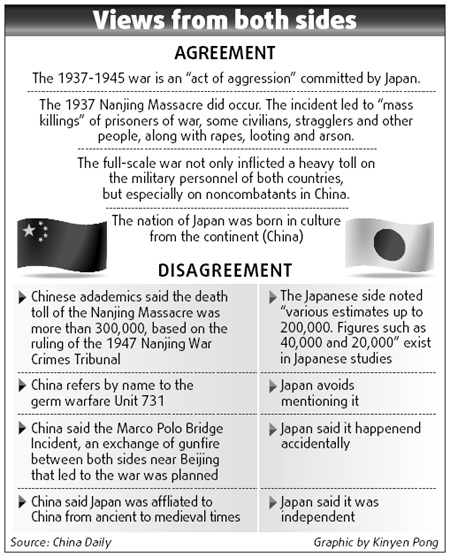Japan admits war 'act of aggression'
By Li Xiaokun (China Daily)
Updated: 2010-02-02 08:35
Joint history study breaks new ground, but differences remain
Japan admitted in a long-awaited report from the joint history study with China on Sunday that the 1937-1945 Sino-Japanese war was an "act of aggression", but the two neighbors are still at odds on a number of issues, such as the death toll of the 1937 Nanjing Massacre.

Bu Ping, Chinese chief commissioner of the joint research, told China Daily yesterday that, despite the divergence, the report carries great importance for improving mutual understanding, especially as it is just the first of such joint studies,
"I hope subsequent studies will lead to a history textbook in the future that is jointly endorsed by the governments of China, Japan and the Republic of Korea," said Bu, director of the Institute of Modern History of the Chinese Academy of Social Sciences (CASS).
In the report Japan used the word "aggression" to refer to the 1937-1945 war for the first time, breaking Tokyo's long-standing reluctance to use it.
Japan's Kyodo news agency said the move ruled out China's long-term concerns that some people in Japan are denying the nation's responsibility and even the fact that it conducted a war of aggression.
The war "left a deep scar on China that was the battleground, and we have to say that most of the causes were created by the Japanese side," said the report.
But despite this deep divisions still remain.
On the number of Chinese killed by the Japanese army after it seized Nanjing - the then Chinese capital - Chinese academics said the number was more than 300,000, based on the ruling of the 1947 Nanjing War Crimes Tribunal.
The Japanese side, however, noted "various estimates up to 200,000, such as 40,000 and 20,000" exist in Japanese studies.
Both sides refrained from asserting a definitive figure.
The research panel member Sumio Hatano, a professor at the University of Tsukuba in Ibaraki Prefecture, told Kyodo there has been no accepted figure because of differences in "the verification of data", notably in terms of the definition of "massacre", the area and period in which the incident took place, burial records, and other sources.
But they agreed that "mass killings" of prisoners of war, civilians, stragglers and other people did occur, along with rapes, looting and arson.
Japan also avoids mentioning germ warfare Unit 731 although China refers to it by name.
Ishii Akira, a professor on East Asia studies with Tokyo University, told Kyodo there would be no conclusion on the death toll of the Nanjing Massacre unless a massive investigation is launched. But Japan should not have ignored the victims of the 731 Unit, he said.
Among other points the two sides disagree on is whether Japan was affiliated to China from ancient to medieval times. However, both sides did agree "the nation of Japan was born from the culture of the (Chinese) continent".
The two governments endorsed the research project in 2006 to improve mutual understanding.
The release of the 530-page report, covering ancient, medieval and modern history, marked the end of the project. A second stage is scheduled to begin soon.
"This is the first step for the two countries to deepen mutual trust. I hope the media, and citizens, can see the positive significance of improving mutual trust," said Bu Ping.
He also said the focus on the Nanjing Massacre is not the death toll but the nature.
Bu has expected many emotional comments on the report but said he would just care about remarks from experts.
"I want to emphasize that the academic disputes are different from gaps between the two countries," he said.
Zhang Baijia, deputy director of the Communist Party of China History Research Center, said the report is a good example of "seeking common ground while reserving differences on minor ones" between China and Japan.
Japanese Foreign Minister Katsuya Okada yesterday welcomed the report, saying, "even if there may have been differences in views I think common understanding can gradually be nurtured by working on it."
Chief Cabinet Secretary of Japan Hirofumi Hirano said yesterday the divergence would not have a negative impact on China-Japan relations.
"History is just history. The government will work for the future," he said.
Tokyo University's Akira Ishii said he was encouraged to notice that in the report China wrote about Japan's efforts to strive for peace at that time.
Kyodo said yesterday the way Germany and France erased their distrust after the war is a positive example for Japan to develop its relations with China, Russia and the Republic of Korea.

Nenhum comentário:
Postar um comentário